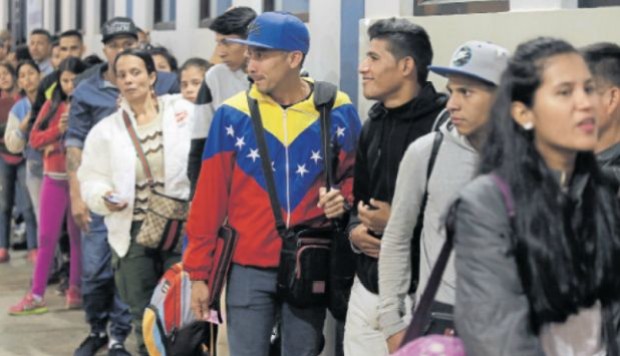
-To the million-
Due to the social and economic crisis generated by the dictatorial regime of Nicolás Maduro, some 635,000 Venezuelans have entered Peru in recent months, according to the National Superintendency of Migration. The figure has increased sixfold during 2018, since in January there were 100 thousand migrants from that country.
The majority of Venezuelans fleeing to Peru are young people of working age (between 18 and 39 years old), and they choose Lima as their city of residence (65% of the total). However, they have also started living in other provincial capitals such as Trujillo (8%), Piura (3%) and Arequipa (3%), according to a recent report prepared by the International Organization for Migration (IOM).
José Iván Dávalos, IOM’s chief of mission in Peru, explained to El Comercio that more men and parents initially crossed the Tumbes border, but today the number of mothers who enter with their children has grown (23% entered to the country with a minor, according to the study).
“There is a stage of family reunification of Venezuelans. This phenomenon is unprecedented in Peru, “he says. The IOM estimated that the number of migrants from Venezuela in our country will not decrease, but would reach one million by 2019.
With or without PTP-
Migrations reported that of the 635 thousand Venezuelans in the country, 558 thousand entered until October 31, the deadline set by the Executive last August for them to qualify for the temporary residence permit (PTP). This document regularizes their immigration status for one year, and allows them to work and access public health services.
Currently, 156 thousand migrants already have the PTP, 217 thousand have started the process and 27 thousand have a pending appointment to obtain it. Also, the entity indicated that about 30 thousand have not yet requested it, so they have until December 31 to do it at the Migrations offices in Lima, or at any of the 14 regional headquarters located in regions (six of the which attend 24 hours).
Roxana del Águila, national superintendent of Migrations, told this newspaper that during this year the Peruvian State has made “a titanic task” to provide a humanitarian service to Venezuelans and obtain the corresponding information, in order to guarantee internal order and citizen security.
“We are the second recipient country of Venezuelans in Latin America [only after Colombia, which already has 1.1 million migrants]. 30% of the people who have entered until October 31 are minors, so we have started a coordinated work with other actors, such as the Health sector, Unicef and IOM, “he says.
From October 31 to date, about 77 thousand Venezuelans have entered the national territory. However, they are no longer authorized to request the PTP. Despite this, according to Migrations, they will not necessarily be irregular because they can opt for other protection mechanisms, such as the refuge (110,000 applications were registered until October) or the immigration card that gives them resident status (which, for example, , it can be processed with a work contract).
Del Águila indicated that the number of Venezuelans who are irregularly located in Peru (due to the expiration of their PTP, or their maximum length of stay as a tourist, of 183 days) “is not significant”, although he did not specify the figure. El Comercio sought the version of the Ministry of Foreign Affairs, but there was no response.
-Professionals seek to go to regions-
This year, the NGO Unión Venezolana in Peru carried out the first stage of the Productive Assimilation program, which aims to add the workforce and professional talent of migrants to fill the existing gaps in the country.
Through a registry, the institution registered 33,884 Venezuelans who had technical or university education. Of these, 88% (about 27 thousand) said they were willing to be relocated to a region of Peru where there was a shortage of trained personnel.
In this first registry, 4,942 health professionals were identified; 4,545 experts in administrative matters; 4,299 in education and sports; and 2,693 in industry, mechanics and related.
Óscar Pérez, president of the NGO, explained to El Comercio that “this human talent is not going to cost the State a sun”, since we are a productive force that wants to contribute its knowledge to the development of the country. He reiterated that he has already sent the proposal to the Foreign Ministry, although the answer is still pending.
“With this the migrant wins and Peru wins. The idea is also that the National Superintendence of University Higher Education [Sunedu] can standardize our academic degrees, “he said.
With information from El Comercio.







